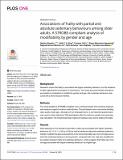| dc.contributor.author | Asiamah, Nestor | |
| dc.contributor.author | Khan, Hafiz T.A. | |
| dc.contributor.author | Yarfi, Cosmos | |
| dc.contributor.author | Agyemand, Simon M. | |
| dc.contributor.author | Arthur Mensah Jnr, Reginald | |
| dc.contributor.author | Muhonja, Faith | |
| dc.date.accessioned | 2024-01-12T07:31:22Z | |
| dc.date.available | 2024-01-12T07:31:22Z | |
| dc.date.issued | 2023-10-26 | |
| dc.identifier.issn | 0293482 | |
| dc.identifier.uri | https://doi.org/10.1371/journal.pone.0293482 | |
| dc.identifier.uri | https://repository.amref.ac.ke/handle/20.500.14173/902 | |
| dc.description.abstract | Research shows that frailty is associated with higher sedentary behaviour, but the evidence
to date regarding this association is inconclusive. This study assessed whether the above
association is moderated or modified by gender and age, with sedentary behaviour measured with a more inclusive method. | en_US |
| dc.language.iso | en | en_US |
| dc.publisher | PLoS ONE | en_US |
| dc.subject | Frailty, Sedentary behaviour, gender, age, f | en_US |
| dc.title | Associations of frailty with partial and absolute sedentary behaviours among older adults: A STROBE-compliant analysis of modifiability by gender and age | en_US |
| dc.type | Article, Journal | en_US |

